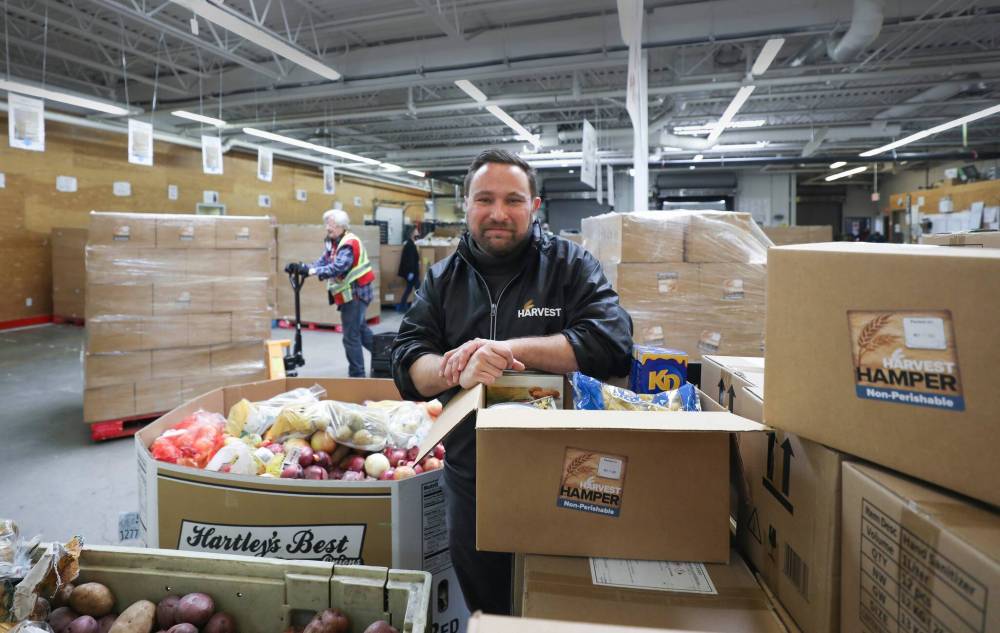Postal strike turns giving season into one fuelled by anxiety for local charities
Advertisement
Read this article for free:
or
Already have an account? Log in here »
To continue reading, please subscribe:
Monthly Digital Subscription
$0 for the first 4 weeks*
- Enjoy unlimited reading on winnipegfreepress.com
- Read the E-Edition, our digital replica newspaper
- Access News Break, our award-winning app
- Play interactive puzzles
*No charge for 4 weeks then price increases to the regular rate of $19.00 plus GST every four weeks. Offer available to new and qualified returning subscribers only. Cancel any time.
Monthly Digital Subscription
$4.75/week*
- Enjoy unlimited reading on winnipegfreepress.com
- Read the E-Edition, our digital replica newspaper
- Access News Break, our award-winning app
- Play interactive puzzles
*Billed as $19 plus GST every four weeks. Cancel any time.
To continue reading, please subscribe:
Add Free Press access to your Brandon Sun subscription for only an additional
$1 for the first 4 weeks*
*Your next subscription payment will increase by $1.00 and you will be charged $16.99 plus GST for four weeks. After four weeks, your payment will increase to $23.99 plus GST every four weeks.
Read unlimited articles for free today:
or
Already have an account? Log in here »
Hey there, time traveller!
This article was published 27/11/2024 (346 days ago), so information in it may no longer be current.
It’s supposed to be the happiest time of the year, but that’s not the case for charities dealing with a nationwide postal strike.
The Christmas season, coupled with the end-of-year deadline for tax-deductible charitable donations is, traditionally, a lifeline for most non-profit organizations.
But since Nov. 15, if someone says the cheque is in the mail, it probably means it’s stuck somewhere in a post office, postal outlet or mail box. Friday marks two full weeks of strike action against Canada Post, and no mail is being delivered.

MIKE DEAL / FREE PRESS FILES
David Kron, executive director of the Cerebral Palsy Association of Manitoba, says charities are hurting.
And, to make matters worse, a federally appointed mediator temporarily suspended talks between postal workers and the Crown corporation Wednesday, because the distance between their bargaining positions is too far apart for meaningful negotiations.
“Big or small, all charities are hurting,” said David Kron, executive director of the Cerebral Palsy Association of Manitoba.
“I don’t have a percentage, but I would say we get maybe a quarter of our donations, outside our events, during the last quarter of the year. We rely on the support of community. We’ve been around for 50 years and we want to be around for 50 more.
“It makes life more difficult without Canada Post.”
While plenty of Winnipeggers donate to local charitable organizations with the click of a mouse, many others choose to do things the old-fashioned way with a cheque, an envelope and a stamp.
Kron said online donations are, of course, welcome but the convenience comes with a cost.
“Credit card companies and PayPal usually take two to five per cent for the transaction and, when you’re a small charity, that’s money we don’t get,” he said. “But there’s no cost to cashing a cheque — we’re just not getting the cheque.”
Officials at the Christmas Cheer Board and Harvest Manitoba are nervously watching the negotiations — or lack thereof — over postal service.
Cheer board executive director Shawna Bell said traditionally about half of the organization’s donations arrive in the mail.
“We haven’t seen mail for almost two weeks now, and that is concerning,” said Bell, who said more donations are being received via e-transfers.
“But there will always be folks that don’t do that. It’s hard to really discern what the effect is at this point of time; we’ll just have to see how things go.”
Harvest executive director Vince Barletta said he and other leaders at various charities “are sweating right now.”
“About 40 per cent of our funds come in the last two months of the year,” Barletta said. “Direct mail to donors and donations coming back from donors is still a big, big part…. I’m asking people, whichever charity you support, please find a way to get that gift to them. They need it. The need is large and we rely on people.”
Mary Beth Taylor, The Winnipeg Foundation’s vice-president of community generosity, said she has been advising the local charitable sector to post information on the web with instructions for donors.

RUTH BONNEVILLE / FREE PRESS FILES
Harvest executive director Vince Barletta said he and other leaders at various charities “are sweating right now.”
“This is a major revenue season for a lot of charities,” said Taylor. “We are making sure our donors aren’t forgetting the charitable sector. People think the use of mail is decreasing, but charities use it to send a reminder to donors and to provide information of what’s happening and the priority of the organizations.
“We are very worried.”
Taylor is asking donors to go online or pick up the phone to help the charities they support.
“Just be very patient, because there will be an increase in call volume,” she said.
Jonathon Lyon, president and CEO of the Health Sciences Centre Foundation, said the strike has come at the worst time for organizations that depend on donated funds.
“There has been a lot of movement to online through the years, but it will still have an impact because a lot of our contributions come through the mail,” he said. “And a lot of people make their giving decisions at this time of year. Our hope is people can go online.”
While the Salvation Army is traditionally known for its Christmas kettle campaigns at street level, spokesman Maj. Al Hoeft said that isn’t the organization’s biggest fundraiser.
“The mail component is huge for us,” said Hoeft. “This is concerning for us. Two-thirds to three-quarters of our donations are raised in November and December.”
He said he hopes people go online, call the donation line or look for a kettle while out shopping.
kevin.rollason@freepress.mb.ca

Kevin Rollason is a general assignment reporter at the Free Press. He graduated from Western University with a Masters of Journalism in 1985 and worked at the Winnipeg Sun until 1988, when he joined the Free Press. He has served as the Free Press’s city hall and law courts reporter and has won several awards, including a National Newspaper Award. Read more about Kevin.
Every piece of reporting Kevin produces is reviewed by an editing team before it is posted online or published in print — part of the Free Press‘s tradition, since 1872, of producing reliable independent journalism. Read more about Free Press’s history and mandate, and learn how our newsroom operates.
Our newsroom depends on a growing audience of readers to power our journalism. If you are not a paid reader, please consider becoming a subscriber.
Our newsroom depends on its audience of readers to power our journalism. Thank you for your support.






